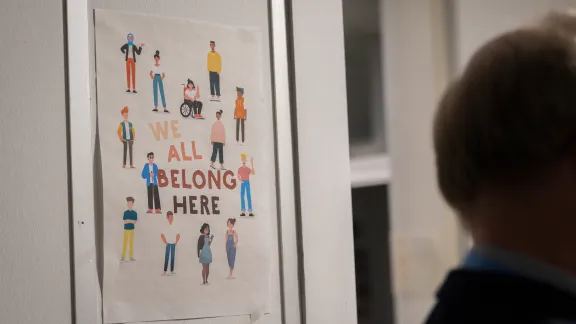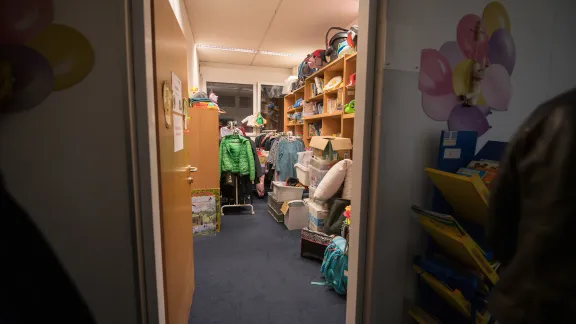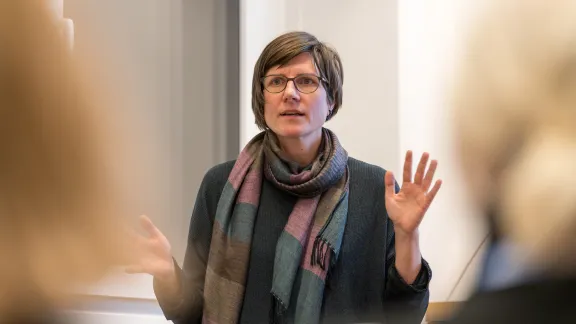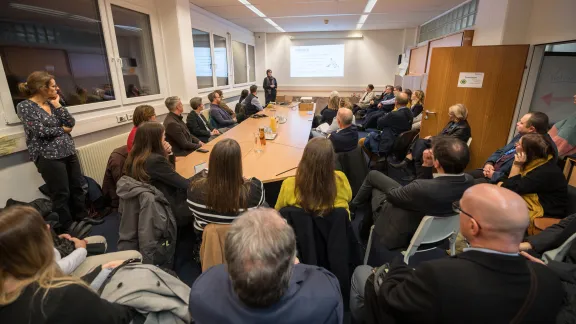
'We all belong here,’ reads a printout at the entrance to a counselling center of Diakonie Austria for Ukraine refugees in Vienna, Austria. Photo: LWF/A. Hillert
A visit to a Counselling Center for Ukrainian refugees in Vienna highlights need for churches to respond holistically to war and conflict
(LWI) - A thousand days on, Russia’s full-scale invasion of Ukraine has left over 14 million Ukrainians displaced, and with no immediate end to the war in sight, support to refugees remains a key priority for churches in Europe.
On 3 December, 44 representatives from The Lutheran World Federation (LWF) member churches across Europe visited the Counselling Center for Ukraine Refugees of Diakonie Austria, an umbrella association of aid and social organizations run by Protestant churches in Austria.
In a country now hosting more than 80,000 Ukrainian refugees under temporary protection status, the Austrian diaconal arm offers a wide range of services including goods’ donation, and counselling for various needs such as psychosocial and medical support, and assistance with housing placement and the labor market.
As the war lingers on, more and more of the refugees, most of whom are women with children now participating in Austria’s mandatory school system, realize that their stay may be more long-term than originally anticipated. “Statistically, we’ve seen in the past year a sharp rise in the number of Ukrainian refugees who express a desire to stay here, rather than return to their home country at the end of the war,” explains Claudia Lui who serves as head of the counselling center.
We try to cover all sides of the life of our refugees. Life is more than our problems
Claudia Lui, Counselling Center for Ukraine Refugees, Diakonie Austria
“Our target is to be a one-stop shop for refugees, offering a variety of services in a variety of languages,” Lui says, noting that so far in 2024, the center has offered 23,000 counselling sessions for some 4,500 people. But support to the refugees is not only about providing technical responses to specific problems, particularly as they begin to integrate more and more, she adds. “We try to cover all sides of the life of our refugees. Life is more than our problems,” she says.
Beyond professional counselling services, the center hosts a wide array of informal spaces, such as chess classes or tournaments for children, or knitting sessions for elderly women, all to help create structure as well as opportunities for social exchange for the refugees.
“And to be honest, our role is often just to provide space — Ukrainian refugees themselves so often come here saying things like ‘I am a photographer or I am a soap bubble artist and I would like to offer something to other refugees,’ and so then we simply help by opening up this space for them to arrange activities,” Lui says.
Theology and service for people in need
During the visit, which was part of an LWF consultation on the theme “Churches Reflecting Together: Peace, Justice, and Reconciliation in Times of War”, Diakonie Austria director Rev. Dr Maria Katharina Moser said “it's always important that theological reflection is grounded in the experience of people, and also gives answers to the diaconal and social challenges we face in times of war and humanitarian crisis.”

Toys, games and clothing for children pictured in one of the desks at the counselling center in Vienna. Photo: LWF/A. Hillert

Claudia Lui, head of a counselling center of Diakonie Austria for Ukraine refugees in Vienna, Austria. Photo: LWF/A. Hillert

Representatives from LWF member churches across Europe visit the Counselling Center for Ukraine Refugees of Diakonie Austria.. Photo: LWF/A. Hillert
She emphasized the “multi-perspective” approach of the counselling center, with its focus on medical and housing issues, on the labor market, and difficult social situations. “But at the same time, people who are suffering under war situations have to build up their lives and find joy again. Volunteers and displaced people themselves come to organize social programs like outings, picnics, or other types of events, and in that part, we see the empowerment aspect,” she concluded.
For Dean Pål Kristian Balstad of the Church of Norway, the visit resonated with challenges faced in a different corner of Europe. “I think it's very inspiring to see how they work here and try to find a way to help the Ukrainian refugees. We are struggling with the same thing in Norway, to open up and to try to figure out how to give the best help for people that are in a very, very hard situation,” Balstad says.
“Europe has a strong fellowship and a tradition for helping, and this gives me hope for the future, also with the questions that we are asking about theologies of peace or war. Coming here takes those reflections down to practical work,” he says. “Theology is not only thinking about how life is or should be, it's about meeting people, it's the gospel in action with people in need and that is very deeply the church’s mission in this world.”
Likewise, Rev. Dr Lilla Molnár, Evangelical Lutheran Church in Hungary, underlines the importance of linking the topics discussed at the consultation and the hands-on work of supporting people in need. “The church has to do all the theological work and address all the ethical questions related to war and peace. But in a sense, we also agreed many times that first of all this is the biggest task, that we have to deal with the people, to recognize their needs and to help them,” Molnár concludes.


